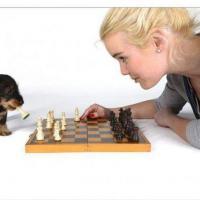
Cute Little Beasts
I am sure that most chess players at some point faced this awkward situation. You are supposed to play a cute little kid only to find out that the appearance is very deceiving and at the chessboard the little tyke is a real beast. You curse your luck and smile in embarrassment when you resign the game. I am talking here from my own experience! When I played in a big International tournament in Calcutta in 1995 I liked everything there. First of all I had another opportunity to meet and talk with the legendary Vassily Smyslov whom I respect a lot ( see my article here: http://www.chess.com/article/view/smyslov-the-tactician) . Also I tied for the first place there and we always love tournaments that we won! The only fly in the ointment was my lame start. I scored just .5 out of my first two games. Well, any experienced chess player knows that such things happen from time to time, but not the way it happened to me in this tournament! In the first round I played a beautiful lady and everyone knows how difficult it is (see my experience here: http://www.chess.com/article/view/to-be-named ). I can blame a jet lag, her beauty, a food poisoning I got due to lack of experience with the Indian cuisine... But the truth is she played well and I didn't, so I wasn't upset with a draw that much. But the true catastrophe happened in the second round when I was supposed to play a little local boy. I didn't know at that point that he was trained by famous Soviet GMs (including Kasparov's ex-second GM Vladimirov) or that he was going to become a very strong GM himself and later assist Vishy Anand on numerous occasions. All I knew was that this little boy whose name I couldn't even pronounce at that time (try it yourself: Surya Sekhar Ganguly) misplayed the opening of our game and got himself in trouble. But the kid just refused to go down without a fight and when I made a mistake in time trouble his punishment was very swift. To add insult to the injury, I was told that my name appeared in the Guinness Book of World Records since I was the GM who lost a tournament game to the youngest player ever since my opponent was just 11 years and 11 months old. (I know in our day and age of Magnus Carlsen that sounds ridiculous. Today if you lose a game to a 12 years old, they ask you 'OK, but what did you expect?').
There is a Russian saying which roughly translated means 'The Truth speaks using a child's lips'. These days I have many chess students of a very young age and I had many opportunities to see how true this saying is. In many cases the kids produce many interesting, creative ideas. Their minds are not polluted by the common knowledge yet and it helps them to think outside the box. So, indeed I feel like sometimes chess Gods talk to us with the help of kids and Magnus is a very good example of this.
In this article I want to present some games played by kids who later became extremely strong chess players. It is interesting to see how at a very young age they already had something that later became their trademark. Let's start with Boris Spassky. He was a typical prodigy of that time which means he became an International Master at the age of 16. Which is not a big deal today when we have 12 year old GMs. To be fair, at that time it was more difficult to get an IM title than a GM title today, but that is a completely separate subject. Anyway, what really made a very strong impression on me is that even in his very early games we can see something that later made Spassky the best player in the World. He would create a tense position out of the opening and then a little spark would lead to a big fire in his opponent's camp. Those weren't crazy assaults of Tal, nor monumental attacks of Alekhine. Looking at his games I cannot help but think of him as a chess version of Muhammed Ali who 'floats like a butterfly and stings like a bee'. Judge for yourself, when Spassky played the following two games he was just 12 years old.
(Just like in most of my articles I give you a chance to test your attacking skills, so the games are given as a Quiz. Please remember that you can always replay the whole game from the first move if you click "Solution" and then "Move list.")



